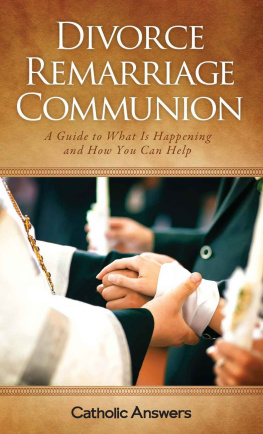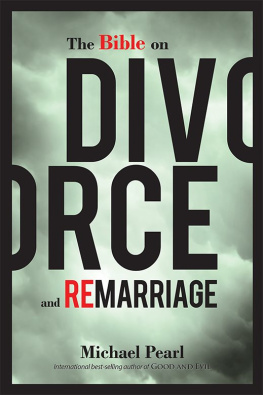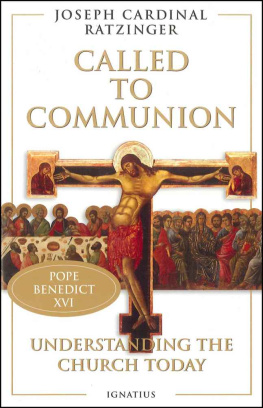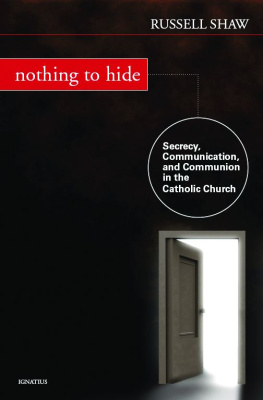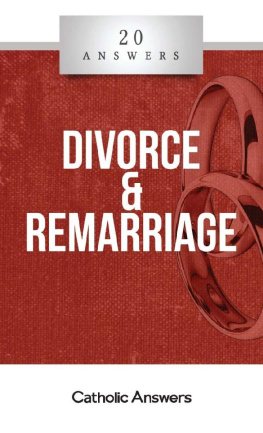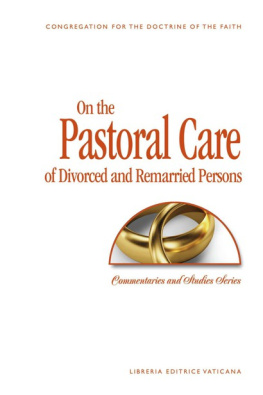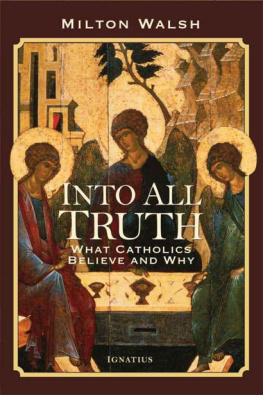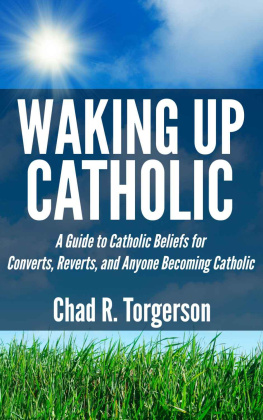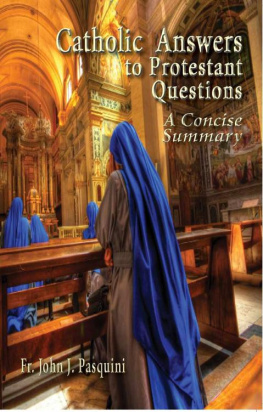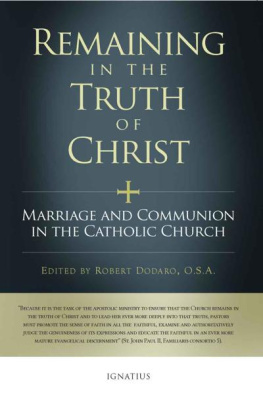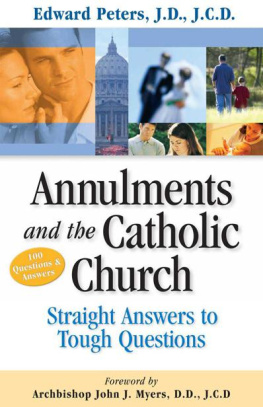Divorce, Remarriage, Communion
A Guide to What Is Happening and How You Can Help

Divorce, Remarriage, Communion
Catholic Answers Staff
2015 Catholic Answers
All rights reserved. Except for quotations, no part of this book may be reproduced or transmitted in any form or by any means, electronic or mechanical, including photocopying, recording, uploading to the Internet, or by any information storage and retrieval system, without written permission from the publisher.
Published by Catholic Answers, Inc.
2020 Gillespie Way
El Cajon, California 92020
1-888-291-8000 orders
619-387-0042 fax
catholic.com
978-1-941663-17-2
978-1-941663-18-9 (Kindle)
978-1-941663-19-6 (ePub)
Its no secret that marriage is in crisis. The problems are widespread, and they include things like:
Divorce
Spousal abandonment
Trial marriages
Living together outside of marriage
Contraception
Abortion
Unwed motherhood
Civil unions
Homosexual marriage
The Church is concerned about all these threats to marriage, and to help deal with them, Pope Francis called for two crucial meetings of bishops.
This type of meeting, known as a synod of bishops, involves a selection of bishops from around the world who are called to consider important issues facing the Church. Pope Francis called for a synod to take place in October 2014 and another in October 2015.
In preparation for both, he urged the bishops to think creatively about ways to help families today, and many proposals have been made.
One proposal in particular has attracted a lot of attention, because it appears to contradict the Churchs historic teaching and practice on marriage.
The concerns raised by the proposal are so serious that cardinalsincluding some close to Pope Francishave been arguing with each other in the news media.
The matter is serious, and the faithful need to support the pastors of the Church as they wrestle with this issue.
This booklet will serve as a guide to the subjectand to how you can help.
What is the controversial proposal that the cardinals are discussing?
Put basically, it is the idea that Catholics who have divorced and remarried without an annulment should, in some circumstances, be admitted to Holy Communion without being required to live chastely.
What is an annulment?
An annulment is a declaration that a particular marriage, for one reason or another, was not valid (i.e., is null).
Such declarations are issued by Church authorities after the circumstances of a marriage have been investigated and sufficient grounds for nullity have been discovered.
If a marriage is found to be null, the parties are not actually married to each other and so are free to marry other people.
Why does the proposal to give Communion to those who have civilly remarried without an annulment appear to contradict Church teaching?
The Church teaches that a valid, consummated marriage between two Christians cannot be dissolved by anything but death.
As a result, if a person who has been married obtains a civil divorce and then wishes to remarry, the Church must look at the first marriage to see if it was valid. If it was valid, the person is not able to marry someone else.
To attempt to do so will result in the person living in a state of ongoing adultery.
Like anyone who engages in unrepented grave sin, those who engage in unrepented adultery are not eligible to receive Communion.
The new proposal appears to contradict the Churchs teaching by allowing those who are committing ongoing adultery without true repentance to receive Communion.
Has the Church dealt with this proposal before?
Yes. Some theologians began discussing it after the Second Vatican Council, and it was discussed at the 1980 Synod of Bishops, which was also on the topic of the family.
Pope St. John Paul II rejected the thinking behind the proposal in the document he released following the 1980 synod. After calling upon pastors and the whole community of the faithful to reach out to divorced and civilly remarried Catholics to keep them from being alienated from the Church, he stated:
However, the Church reaffirms her practice, which is based upon Sacred Scripture, of not admitting to Eucharistic Communion divorced persons who have remarried. They are unable to be admitted thereto from the fact that their state and condition of life objectively contradicts that union of love between Christ and the Church which is signified and effected by the Eucharist. Besides this, there is another special pastoral reason: If these people were admitted to the Eucharist, the faithful would be led into error and confusion regarding the Churchs teaching about the indissolubility of marriage ( Familiaris Consortio 84).
Does the Church have pastoral concern for people in this situation?
Absolutely! John Paul II stated:
I earnestly call upon pastors and the whole community of the faithful to help the divorced, and with solicitous care to make sure that they do not consider themselves as separated from the Church, for as baptized persons they can, and indeed must, share in her life. They should be encouraged to listen to the word of God, to attend the Sacrifice of the Mass, to persevere in prayer, to contribute to works of charity and to community efforts in favor of justice, to bring up their children in the Christian faith, to cultivate the spirit and practice of penance and thus implore, day by day, Gods grace. Let the Church pray for them, encourage them and show herself a merciful mother, and thus sustain them in faith and hope ( ibid .).
Does the Church offer a way for these people to be reconciled with the Church and be readmitted to Communion?
Yes. John Paul II also stated:
Reconciliation in the sacrament of Penance which would open the way to the Eucharist, can only be granted to those who, repenting of having broken the sign of the Covenant and of fidelity to Christ, are sincerely ready to undertake a way of life that is no longer in contradiction to the indissolubility of marriage. This means, in practice, that when, for serious reasons, such as for example the childrens upbringing, a man and a woman cannot satisfy the obligation to separate, they take on themselves the duty to live in complete continence, that is, by abstinence from the acts proper to married couples ( ibid .).
Has the subject come up again in the years since?
Yes. In July, 1993, three German bishopsArchbishop Oskar Saier, Bishop Karl Lehmann, and Bishop Walter Kasperpublished a pastoral letter advocating Communion for the divorced and civilly remarried.
What was the Churchs response?
The Congregation for the Doctrine of the Faith, then headed by Cardinal Joseph Ratzinger (later Pope Benedict XVI), issued a letter to the bishops of the world that reiterated the Churchs teaching:
In fidelity to the words of Jesus Christ, the Church affirms that a new union cannot be recognized as valid if the preceding marriage was valid. If the divorced are remarried civilly, they find themselves in a situation that objectively contravenes Gods law. Consequently, they cannot receive Holy Communion as long as this situation persists.
This norm is not at all a punishment or a discrimination against the divorced and remarried, but rather expresses an objective situation that of itself renders impossible the reception of Holy Communion ( Letter Concerning the Reception of Holy Communion by the Divorced and Remarried Members of the Faithful, Sept. 14, 1994).
The letter, which John Paul II approved, pointed to the same solutions involving the parties repenting, going to confession, and either separating or living as brother and sister.
Next page
